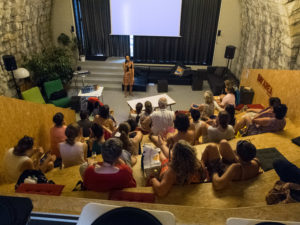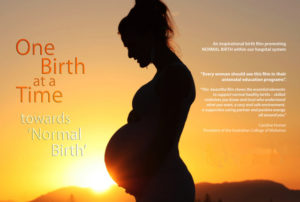Am 13.08.2015 findet in Berliner Kino Babylon die in Deutschland einzige Filmvorführung und persönliche Präsentation der Filme „Geburt gegen Widerstand“ und „One Birth at Time“ der australisch-österreichischen Filmemacherin Karin Ecker statt. Sie ist weltweit bekannt durch ihre Arbeit über den selbstbestimmten Weg zur Geburt.
In einem herausragenden filmischen Portrait („Geburt gegen Widerstand“ (2010) hat sie ihren eigenen Weg beschrieben, der unter anderem die Bedeutung von einem vertrauensvollen Unterstützungsnetzwerk bei Fragen zur Schwangerschaft, Geburt und Wochenbett darstellt. Aktuell hat sie eine Arbeitsreihe an Filmen begonnen, welche in einzelnen Portraits die verschiedenen Möglichkeiten der Geburt und ausgewogen die einzelnen Vor- und Nachteile und Risiken beleuchtet. Darin wird die Bedeutung der Hebammenarbeit, Geburtsbegleitung und Unterstützung im Wochenbett betont. Die Filme werden in Australien landesweit im Rahmen der Geburtsvorbereitungskurse eingesetzt und nunmehr auch für weitere Länder adaptiert.
Wir haben Karin vorab für ein Interview gewinnen können und möchten Euch heute daran teilhaben lassen:
Karin, dein erster Film zum Thema Geburt – “Geburt gegen Widerstand” (Englisch- “A Breech in the System”) – ging um dein persönliches Streben nach einer vaginalen Geburt trotz Beckenendlage in der 38. Woche. Was hat dich dazu geführt, weiterführend den Film „One Birth at a Time“ zu drehen?
Genau wir ihr (maternita) möchte ich, dass Frauen sich stark fühlen und dass sie die verschiedene Möglichkeiten bezüglich der Geburt kennen lernen. Die Idee für den Film kam eigentlich von einer Freundin von mir, die 25 Jahre lang Hebamme war und auch für die Inhalte der Geburtsvorbereitungskurse in Sydney zuständig war. Sie hat mich gefragt, ob ich bereit wäre, eine normale Geburt in einem Krankenhaus zu filmen. Das hat mich überrascht, weil ich mir gedacht habe: „Gibt es nicht schon viele solcher Filme, die ‚normale‘ Geburten zeigen, ohne Einleitung, ohne medizinischen Eingriffe?“ Leider ist die Antwort auf diese Frage „Nein“. In der Tat sind in Australien nur 10% der Geburten, die im Krankenhaus stattfinden, als ‚normal‘ zu betrachten. Das war für mich wirklich schockierend.
Ich habe dann eine Frau kennengelernt, die wollte, dass ich ihre Geburt filme, da sie meinen eigenen Geburtsfilm gut fand. Ich habe sie gefragt, ob ich diesen Film als Lehrmittel der Öffentlichkeit zeigen dürfte. Weil es die Geburt von ihrem dritten Kind sein würde, hat sie „Ja“ gesagt und war sehr glücklich, ein Vorbild für andere Frauen sein zu können und ihr Selbstvertrauen anderen Frauen zeigen zu können.
Du hast die Geburt Deines Sohnes verfilmt mit welchem Hintergrund?
Ich habe die Geburt meines Sohnes gefilmt, weil ich möchte, dass er weiß, wie er zur Welt gekommen ist. Während das sehr konfrontierend ist, denke ich, dass es wahnsinnig ist zu sehen, wie du geboren wirst und deine Mutter so zu sehen.
Die Geburt ist in der heutigen Gesellschaft viel zu sehr tabuisiert geworden. Mit meinem Film versuche ich hervorzuheben, dass Frauen von der Ärzteschaft Respekt und Anerkennung für diese Leistung (die Geburt) verdient haben. Die Geburt soll kein medizinisch geleiteter Prozess sein und mein Film zeigt, dass es nicht so sein muss. Ja, es ist intim, aber jede Geburt ist intim, ob auf Film gebannt oder nicht.
Was waren die Herausforderungen bei dem Film?
Die größte Herausforderung war die Finanzierung. Ich habe den Film selbst finanziert, da ich leidenschaftlich daran geglaubt habe. Meiner Vorstellung nach würde ich mit Hilfe eines Sponsors den Film als pädagogisches Instrument verschenken. Allerdings gab es wegen des Themas des Filmes viele Hürden bezüglich der potenziellen Unterstützung zu überwinden. Es schien mir als ob die Organisationen, mit denen ich Kontakt aufnahm, Angst hätten, einen Film über die Geburt zu unterstützen.
WELEDA AUSTRALIA hat das Projekt unterstützt, worüber ich mich sehr gefreut habe, da ich ihre Produkte toll finde.
Es hat sich aber herausgestellt, dass ich den Film doch nicht kostenfrei zur Verfügung stellen konnte. Trotzdem habe ich viel Unterstützung bekommen und der Film wird jetzt häufig als das von mir vorgesehene pädagogische Instrument genutzt.
Was würdest du anders machen und warum?
Ich würde mich mehr trauen und würde weniger Zeit für die Sponsorensuche verschwenden. Anträge zu schreiben hat viel Energie verbraucht, und oft waren die von mir angesprochenen Firmen zu konservativ, um den Film unterstützen zu wollen.
Wie sehen Deine Pläne für die Zukunft aus? In welche Richtung geht Deine Arbeit?
Ich habe schon etwas Neues in Australien angefangen: Retreats (Deutsch: “Kuren”) für Schwangere, die sich auf Selbstbestimmung und Information fokussieren. Ich würde diese gerne in anderen Ländern anbieten und dadurch Frauen weltweit helfen, ihre Geburten selbstbestimmt zu erleben.
Ich plane auch, den Film in verschiedenen Sprachen anzubieten mit lokalisierten Interviews mit Geburtshelfern. Mein Ziel ist es, Frauen und der Geburtshilfe zu ermöglichen zusammen zu kommen und Verständnis für einander aufzubauen. Ich finde es wichtig, eine vertrauensvolle Beziehung zu fördern, da beide Seiten vor dem Hintergrund ihrer eigenen Erfahrungen unsicher sind. Durch diese Unsicherheit wird die Geburt medizinischer und institutionalisierter. Eine Veränderung ist nötig, und ich glaube, die Zeit ist reif dafür.
Zum Thema Unsicherheit und Veränderung: Ich bin mir sicher, dass du die Lage der Hebammen in Deutschland kennst. Bist du optimistisch hinsichtlich der Zukunft der Geburt in Deutschland?
Es ist beängstigend. Ich habe Europa im Vergleich mit Australien als fortschrittlicher in Fragen der sozialen Grundversorgung betrachtet. Was hier vorgeht ist definitiv nicht richtig. Wir sollten nur die Hoffnung nicht aufgeben, dass sich die Lage verbessert. Ich hoffe, dass Frauen weiterhin bezüglich ihrer Schwangerschaft, Geburt und ihres Wochenbetts selbstbestimmt handeln dürfen. Die richtige Unterstützung (…durch Hebammen) ist wichtig. Das weiß ich durch mein eigenes Geburtsszenario: Diese Unterstützung war für meinen Erfolg entscheidend.
maternita als Schwangerschaftsconcierge und Baby Planer strebt danach, (werdende) Eltern mit neutralen, einfachen Informationen den Rücken zu stärken. Meinst du, dass dieser Service eine Wachstumsindustrie darstellt in einer Gesellschaft, in der Familienunterstützung wegen höherer Mobilität begrenzt ist?
Definitiv! Solche Dienstleistungen sind nötig, da sich viele Frauen während der Schwangerschaft und Geburt verunsichert fühlen. Viele blicken zurück auf diese Zeit und wünschen, sie hätten während der Schwangerschaft von bestimmten Dingen (wie Dienstleistungen) vorab gewusst. Deshalb sind Angebote wie das von maternita und Ellie V’ant Grey so wichtig.
Ich arbeite momentan an einem neuen Film mit dem Titel „Birth Matters“, der die Geburt in verschiedenen Ländern behandelt. Ich hoffe, wenn Frauen den Standard in anderen Ländern sehen, zum Beispiel in Nordeuropa, dass ihre Aufmerksamkeit erweckt wird, und dass sie sagen „Ich will das auch!“ und sie sich darauffolgend für einen höheren Standard in ihren Ländern einsetzen.
Zum Schluß: Welche Nachricht möchtest du an unsere/n Leser/innen in Deutschland/Berlin mitteilen?
Kommt doch am 13. August zur Filmvorführung vorbei!

Mit freundlicher Genehmigung von Karin Ecker: Filmvorführung und Podiumsdiksussion in Zürich
Ab sofort sind Tickets für den Filmabend mit Karin Ecker in Berlin erhältlich!
ellievantgrey.com unterstützt die Veranstaltung und lässt Euch den Ticketpreis selbst festlegen- damit ein möglichst vielfältiges Publikum erreicht wird und es ein lebendiger Abend wird.
Sichert jetzt Euren Platz unter https://ellievantgrey.com/karin-ecker-in-europa/
 Die Veranstaltung wird organisiert von Ellie v’ant Grey mit freundlicher Unterstützung durch maternita.
Die Veranstaltung wird organisiert von Ellie v’ant Grey mit freundlicher Unterstützung durch maternita.
Bildnachweis: fotolia © poligonchik
On 13.08.2015 Australian-Austrian filmmaker, Karin Ecker will be personally presenting her films, “A Breech in the System” and “One Birth at a Time” at Berlin cinema Babylon. Karin is known worldwide for her work on the subject of empowerment regarding birth.
In an amazing film portrait, „A Breech in the System“ (2010), Karin describes her own birthing journey and demonstrates, among other things, the importance of a trusted support network concerning questions about pregnancy, birth and the time afterwards.
Now she has begun a series of films highlighting the different possibilities for birth and a balanced account of the pros and cons and risks of these. The importance of midwives and support during the time following the birth is also emphasised. The films are being used nationwide in Australia as part of antenatal education and will be adapted and localised for further countries.
We managed to catch up with Karin for an interview and it’s our great pleasure to be able to share this with you:
Karin, your first birth-focused documentary, „A Breech in the System“ followed your personal quest for a vaginal birth, despite breech presentation at 38 weeks of pregnancy. What in particular prompted you to carry on in a similar direction to create „One Birth at a Time“?
Much like yourselves, I have a desire to help women to become more empowered and find out about the different options available to them for their births. The idea came from a friend of mine, who was a midwife for 25 years and in charge of antenatal education in Sydney. She asked me if I would make a film showing a normal hospital birth, which I felt was a strange request – weren’t there already lots of films documenting ’normal‘ births that were not induced and with no interventions? The answer is unfortunately, „No“. In fact, only 10% of hospital births in Australia are what you might consider ’normal‘. That was really shocking for me.
I then met a lady who wanted me to film her birth because she liked my own birth film and I asked if I could show this to the public as an educational tool. This being her third birth, she luckily said yes and was really excited about being a role model and sharing her confidence with other women.
On the subject of filming her birth:
I filmed my child’s birth because I wanted him to know how he was born. As much as this is very confronting, I think it’s an incredible thing to see yourself born, to see your mother like that.
Birth has become far too taboo in today’s society. With my film, I’m trying to highlight that the medical profession needs to honour and respect women for this amazing feat! Birth shouldn’t be a medically managed process and my film helps to show that it doesn’t need to be. Yes. it’s intimate but every birth is intimate, whether captured on film or not.
What were the challenges you faced when making this film?
My main challenge was financing. I self-financed the film because I was passionate about it. I had this vision that I would give the film away as an educational tool, with the help of a sponsor. However, the nature of the film meant that there were so many politics surrounding sponsorship. There seemed to be fear of showing support for a birth film, as if it could be held against the institutions I approached. I did receive WELEDA AUSTRALIA as a sponsor, which I am very grateful about, as I love the product and it also stands for making an empowered decision in choosing a wonderful product for mother and baby.
In the end, I couldn’t give away the film for free but despite this, I still got a lot of support and the film has become widely used as the educational tool it was created to be.
What, if anything would you do differently and why?
I would have more confidence in the fact that I could do it and would waste less time trying to find sponsors. Writing proposals took up lots of energy and it ended up that big companies were too conservative to support the film.
What are your plans for the future? In which direction do you see your work going?
I’ve already started something in Australia: Retreats for pregnant women, focusing on empowerment and education. I hope to expand these to different countries, helping women across the world to take charge of their births.
I also plan to dub the film into different lanuages and conduct localised interviews with obstetricians. My goal is to empower women and birth professionals, bringing them together and helping them to understand each other. I think it’s important to encourage a more trusting relationship because each side is fearful for their own reasons, thus making birth more medicalised and institutionalised. A change is necessary and I think the timing is right.
On the subject of fear and change, I’m sure you’re aware of the situation that midwives in Germany are facing due to an increase in insurance premiums and lack of options as far as insurance coverage goes: Are you optimistic about the future of birthing in Germany?
It’s scary. I always viewed Europe as more social in comparison with Australia. What’s happening is definitely not right. I just hope the more the oppression happens, the more people will rise up and say, „No!“. We need to have hope that things will get better. I hope that families are becoming empowered in making informed decisions for their birth and the care afterwards. Having the right support is crucial. Having had the support I had for my birth scenario made all the difference and I believe this was most important for my success.
Maternita is a Maternity Concierge and Baby Planner service that strived to empower pregnant women, fathers-to-be and new families by providing information in a neutral and easy-to-understand way. Do you see this type of service as a growing area in a society where support from family and friends might be limited due to an increase in mobility and the concept of a ‚global village‘?
Yes, it’s so necessary because a lot of women feel disempowered during pregnancy and birth. So many people look back in retrospect and say they wish they’d known about certain things (like services) when they were pregnant so good information is vital. This is why the services of the likes of maternita and Ellie V’ant Grey, the initiator of the event at Kino Babylon so important.
I’m currently working on new new film called „Birth Matters“ about birth in different countries. I hope that when women see the standard, for example in Northern European countries, they will sit up and say „I want that“ and use their lobby to raise standards in their own countries.
Finally, what message would you like to give to our readers here in Germany/Berlin?
Come to the screening on 13th August!

Mit freundlicher Genehmigung von Karin Ecker: Filmvorführung und Podiumsdiksussion in Zürich
Avail able now! Tickets for the movie screening with Karin Ecker in Berlin!
able now! Tickets for the movie screening with Karin Ecker in Berlin!
ellievantgrey.com is supporting the event and you pay what you want-to help gather a diverse audience and induce a lively discussion.
Secure your seat at https://ellievantgrey.com/karin-ecker-in-europa/?lang=en
With friendly support of maternita.
picture source: fotolia © poligonchik





Recent Comments